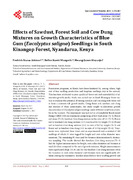| dc.contributor.author | Ashiono, Fredrick Atanas | |
| dc.contributor.author | Wangechi, Hellen Kamiri | |
| dc.contributor.author | Kinyanjui, Mwangi James | |
| dc.date.accessioned | 2018-09-05T08:25:23Z | |
| dc.date.available | 2018-09-05T08:25:23Z | |
| dc.date.issued | 2017-09 | |
| dc.identifier.citation | Open Journal of Forestry, 2017, 7, 373-387 | en_US |
| dc.identifier.issn | 2163-0429 | |
| dc.identifier.issn | 2163-0437 | |
| dc.identifier.uri | https://karuspace.karu.ac.ke/handle/20.500.12092/2134 | |
| dc.description | DOI: 10.4236/ojf.2017.74022 | en_US |
| dc.description.abstract | Forestation programs, in Kenya have been hindered by, among others, high cost of tree seedling production and longtime seedlings stay in the nursery. This has been attributed to poor quality of forest soil and unavailability of alternative growth media. Study was carried out in South Kinangop forest station to evaluate the potential of mixing sawdust and cow dung with forest soil to form a nutrient rich growth media. Using forest soil; sawdust, cow dung and mixture of these components, this study sought to determine growth characteristics of Eucalyptus saligna seedlings
under different conditions available in the nursery . The experiment was laid out in a Completely Randomized Design (CRD) with six treatments comprising of Saw dust alone (Tr 1), Forest soil alone (Tr 2); Sawdust: Cow dung mixture in the ratio of 1:1 (Tr 3); Forest soil to Sawdust-Cow dung mixture (1:1) in ratio of 1:1 by weight (Tr 4); Forest soil to Sawdust-Cow dung mixture (1:1) in ratio of 1:2 by weight (Tr 5) and Forest soil to Sawdust-Cow dung (1:1) in ratio of 1:3 by weight (Tr 6). Treatments were replicated three times and an experimental unit consisted of 110 seedlings of which 15 were tagged for height and root collar diameter measurement. The remaining 95 were used for biomass determination by destructive sampling. The results showed that Sawdust: Cow dung mixtures (Tr 3) had the highest measurements for height, root collar diameter and biomass at week 20 when compared to the rest of growth mixtures. Height measurements were significantly high (13.81 cm) for the Sawdust: Cow dung mixtures while the variation in root collar diameter and biomass were not significantly different among the treatments. Sawdust alone did not favor seedling growth and recorded the lowest measurements in height, root collar diameter and biomass. Nutrient release from the growth media during the experimental period was equally high for the Saw dust: Cow dung mixture (Tr 3) which was ideal media for raising tree seedlings. The findings of this study illustrate the usability of sawdust and cow dung in enhancing the productivity of tree nurseries and shortening the time taken for raising seedlings in the tree nursery. The findings also propose a safe disposal of saw dust that poses as an environmental waste. | en_US |
| dc.language.iso | en | en_US |
| dc.publisher | Scientific Research Publishing | en_US |
| dc.subject | CowDung | en_US |
| dc.subject | Forest Soil | en_US |
| dc.subject | Sawdust | en_US |
| dc.subject | Tree Seedling | en_US |
| dc.title | Effects of Sawdust, Forest Soil and Cow Dung Mixtures on Growth Characteristics of Blue Gum (Eucalyptus saligna) Seedlings in South Kinangop Forest, Nyandarua, Kenya | en_US |
| dc.type | Article | en_US |
